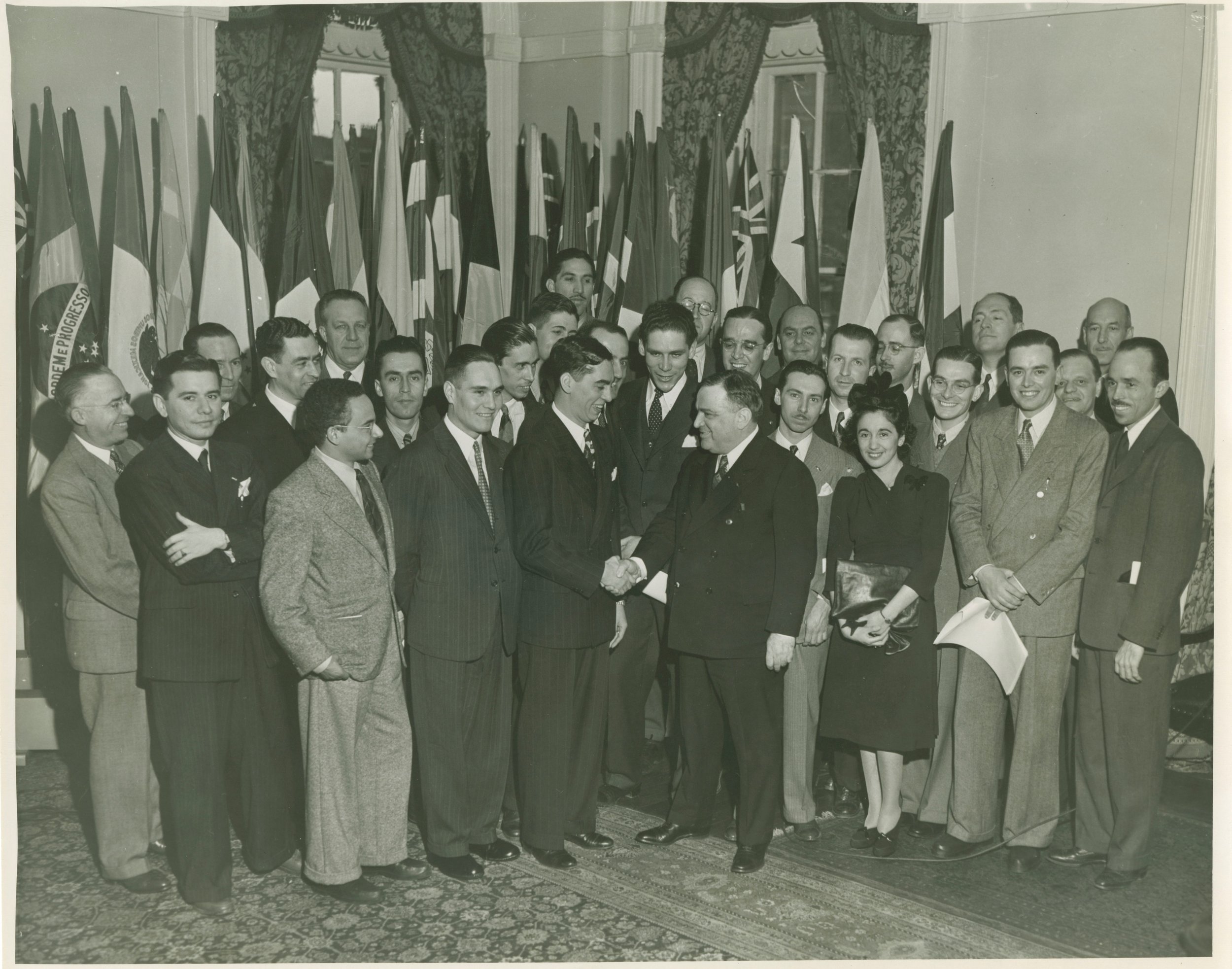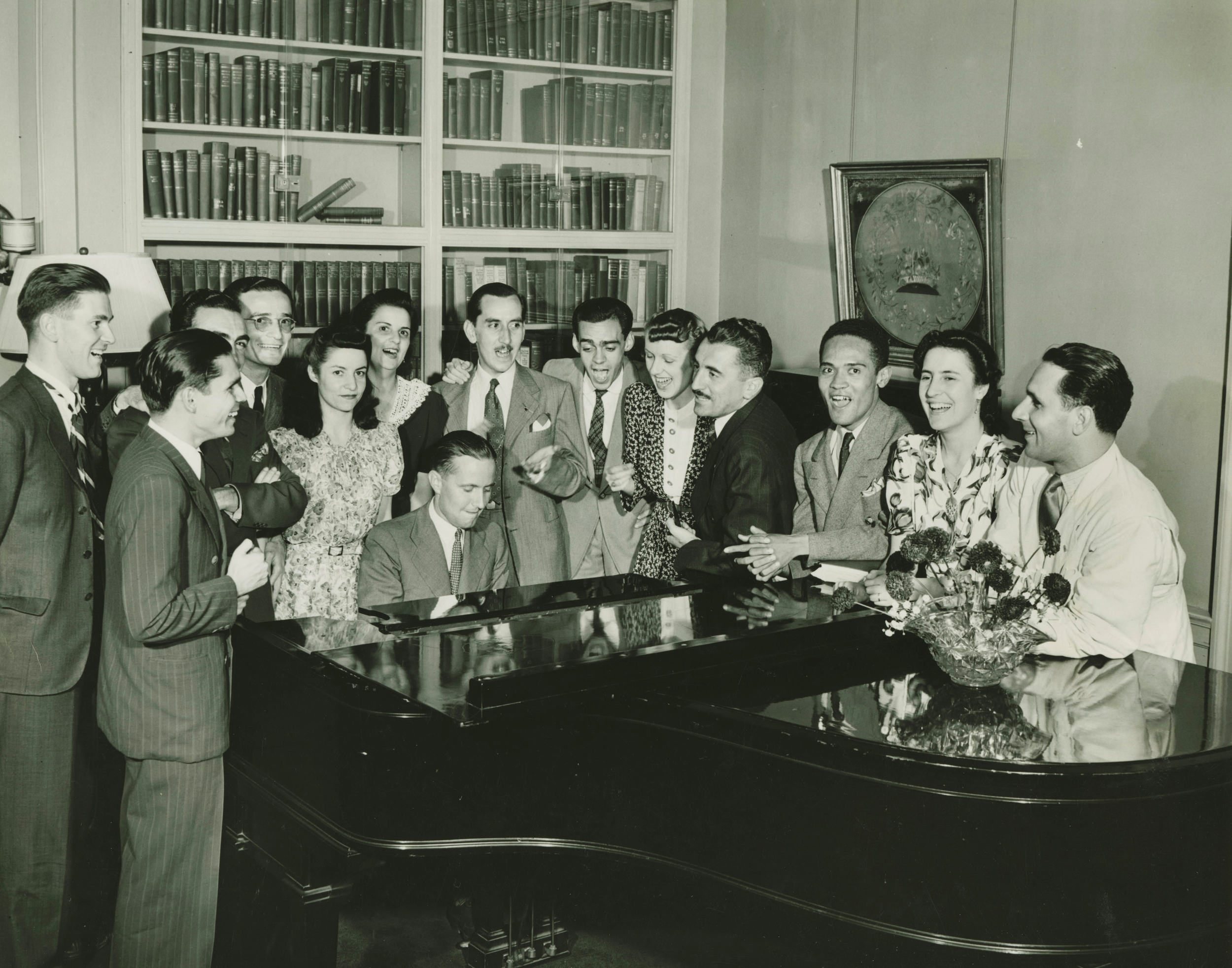Eighty years ago, Mayor Fiorello LaGuardia invited college students from all the nations of Latin America and the Caribbean to apply for scholarships to study in New York City. He established the New York City Committee for Latin American Scholarships, Inc. to administer the program, select the students, and facilitate their travel and housing.
Mayor LaGuardia greets Latin American Scholarship students and sponsors at City Hall, January 4, 1944. Mayor Fiorello LaGuardia photograph collection. NYC Municipal Archives.
LaGuardia chaired the Committee. Rebecca Rankin, chief librarian of the Municipal Reference Library served as its secretary. He appointed prominent New Yorkers as trustees, including Ordway Tead, President of the Board of Higher Education, and David Rockefeller, then serving as head of the Federal Office of Coordinator of Inter-American affairs. To fund the program, LaGuardia solicited corporate sponsors such as the United Fruit Company, Macy’s, Standard Oil, the Grace Line, American Chiclet Company, Pan-American Airlines, International Business Machines, Chase National Bank, U. S. Steel, and Bayer.
The Committee offered one-year scholarships for up to twenty students per year. It also granted a monthly stipend for living expenses. International House, on the Columbia University campus, provided housing. United States Embassies and Consulates throughout Latin America made the applications available to potential scholars.
Rebecca Rankin, Head Librarian, Municipal Reference Library (Left) with Lillian Slaughter, Latin American Scholarship student, 1943. Mayor Fiorello LaGuardia photograph collection. NYC Municipal Archives.
The Municipal Archives provides extensive documentation of the program and the students. The files total approximately five cubic feet and are maintained as a separate series within the Mayor Fiorello LaGuardia collection. As noted in previous For the Record articles, LaGuardia’s correspondence files contain ample evidence of his personal attention to every detail of the administration, and the scholarship series is not an exception.
Mayor LaGuardia formally launched the Scholarship program in 1941. On October 24, 1941, radio station WNYC interviewed the Mayor about his new program. A transcript of the conversation is filed in the scholarship series. Announcer: “Mr. LaGuardia, we understand the joy that you must feel at this moment because we know that you have worked for some time for the establishment of these Latin-American scholarships in New York.” The Mayor replied: “Yes, you’re right. About two years ago I proposed this idea and today I finally see my dream realized.” The announcer then asked, “Mr. LaGuardia, we would like to know what gave you the idea for these scholarships.” The Mayor answered: “Well, it is difficult to say exactly what led me to think of establishing scholarships … But the fact that our City has so many educational facilities . . . convinced me that these facilities should be placed as the disposition of students from all over the Americas. A great number of visitors and friends from all parts of the Hemisphere . . . agreed with me.”
Latin American Scholarship student Felix Morisseau-Leroy, Haiti, in classroom, 1942. Mayor Fiorello LaGuardia photograph collection. NYC Municipal Archives.
In February 1942, Mayor LaGuardia issued a press release naming twenty scholarship winners that had been chosen from more than 400 applicants. Their fields of study ranged from social medicine, radio engineering, and building construction, to political economy and public transportation.
The files include the Committee’s Annual Reports prepared by the Secretary, Rebecca Rankin. In 1943/44, she wrote “Due to war conditions, all students were transported by plane to New York this year which made the costs very high.” The report continued with this statement: “As in the previous year, the Secretary has been forced to act as supervisor of the students’ educational program and advisor for professional advancement. No two students have the same problems.” The narrative further commented on the students’ needs that had become Rankin’s apparently unexpected responsibility.
Latin American Scholarship students at International House, 1942. Mayor Fiorello LaGuardia photograph collection. NYC Municipal Archives.
The Committee files contain individual folders for most of the scholars. They typically contain their application, copies of the award letter, and correspondence related to housing, transportation, course work, etc. Other documents in the files pertain to the “social arrangements” for the students. In June 1942, they traveled to Endicott, N.Y. for a tour of the International Business Machines factory and entertainment at the I.B.M. County Club. For the 1943/44 year, their activities included tea at International House, cocktail party at Macy’s, tour of LaGuardia Field, performance of the opera La Traviata at City Center, and a Mayor’s Reception at City Hall, followed by a cocktail party at the Rockefeller Center Luncheon Lounge.
Maria Isabel Escobar Quintana, Latin American Scholarship student, 1943. Mayor Fiorello LaGuardia photograph collection. NYC Municipal Archives.
Scholarship Application for 1943, submitted by Maria Isabel Escobar Quintana. Mayor Fiorello LaGuardia collection. NYC Municipal Archives.
On April 2, 1946, Rankin, the Committee Secretary, wrote to David Rockefeller: “May 30, 1946 will complete the year of study for our present 19 students and that will end the experiment….” We of the Committee are convinced it is the proper time to bring this project to an ending. With the return of the Veterans who rightfully have first place at education, the colleges are filled beyond capacity and can not give attention to foreign students.” Rankin concluded: “Perhaps after a few years, four years to be exact, after American soldiers have been educated, the City may well encourage Latin-Americans again. We have given these exceptional opportunities for 4 women and 55 men in the past three years.”
Latin American Scholarship students, after donating blood to Red Cross, being served coffee, April 5, 1944. Mayor Fiorello LaGuardia photograph collection. NYC Municipal Archives.
During his interview with WNYC announcing the program in 1941, Mayor LaGuardia concluded by saying that “… I believe that a City like New York ought to make it a duty to contribute to the better development of Inter-American relations.” Perhaps researchers examining the files of the Latin-American scholars will trace their careers and find they did indeed contribute to a better understanding between nations.






